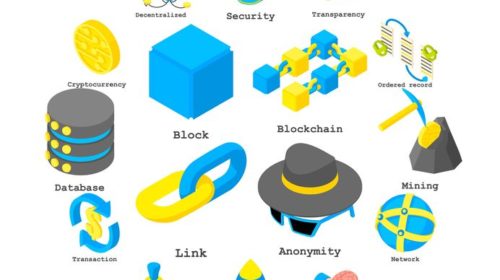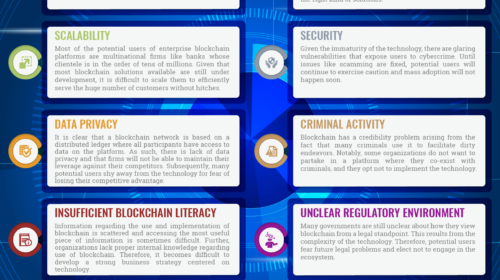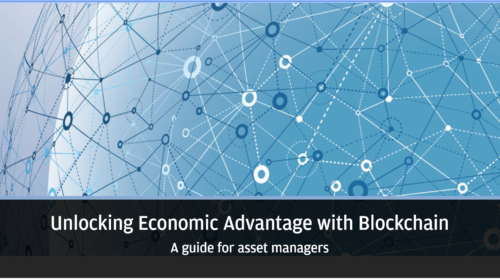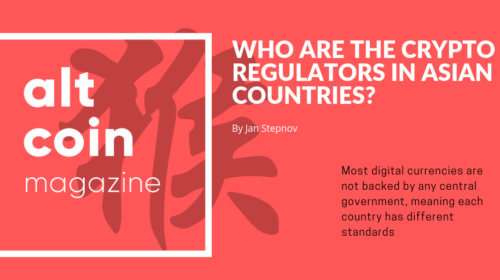Trust “There is one thing that is common to every individual, relationship, team, family, organization, nation, economy and civilization throughout the world — one thing which, if removed, will destroy the most powerful government, the most successful business, the most thriving economy, the most influential leadership, the greatest friendship, the strongest character, the deepest love. On the other hand, if developed and leveraged, that one thing has the potential to create unparalleled success and prosperity in every dimension of life. That one thing is trust.” The speed of Trust, by…
Category: Knowledgebase
Blockchain – Challenges
While Blockchain is not necessarily the solution for every company and every problem, it still remains underutilized for many use cases. During the 2019 Blockchain Congress Geneva, Toufi Saliba ( 2019) presented that less than 0.2% Global Adoption Over 99.8% are still excluded, and he listed five problems related to the necessary Security, Efficiency, Confidentially Scalability and Interoperability. He explains further that ledger-based Blockchains fall short in providing true decentralization of power resulting in network forks or increased risks of 51% attacks”. Size of the network is vital, because if…
Data Privacy
The Merriam-Webster defines privacy as freedom from unauthorised intrusion. Data privacy is not necessarily about secrecy or having something to hide. It is about control related to the use and disclosure of data (Cavoukian, 2017); the capability to choose whether the information is disclosed to others and determine how it is used, as mentioned by Steven T. Snyder (2019). Snyder also added that “The highest degree of privacy for an element of information would be if its owner had complete control over its dissemination and use for as long as…
What’s a Sybil Attack & How Do Blockchains Mitigate Them?
31 AUGUST 2018, BENNETT GARNER A Sybil attack is an attempt to control a peer network by creating multiple fake identities. To outside observers, these fake identities appear to be unique users. However, behind the scenes, a single entity controls many identities at once. As a result, that entity can influence the network through additional voting power in a democratic network, or echo chamber messaging in a social network. The United States’ recent trouble with Russian election influence via fake accounts on social media is an easy-to-understand example of a…
As the Blockchain Hype Dies, Why Should We Care About Practical TestNets?
Joe Liebkind 03/03/2019 Blockchain News, Crypto, News, Opinion The blockchain era has largely been defined by grandiose promises and ambitions, but little to show for it. For most companies, even those that successfully complete ICOs, we usually hear loud guarantees of life-changing and revolutionary technology. In the end, however, these “game-changers” end in the same place most others do, the dustbin of history. Reports of a vast majority of blockchain projects fizzing out or simply vanishing have become common, and those applications still around are forced to shoulder the burden and standard of the industry. In this…
Can Blockchain Keep Refugees From Becoming “Invisible”?
When Toufic Al Rjula applied for asylum in the Netherlands four years ago, he handed over all the original copies of his documents to the immigration office: his passport, his driver’s license, everything. “They even took my library card,” he says. His asylum claim took two years to be processed, during which time he had no legal proof of his identity. Al Rjula, who is Syrian, had been living in the Netherlands on a work contract before seeking asylum. “I thought: ‘I live in the Netherlands, I have a tax…
Blockchain Technology Expected to Grow 66.4% in next 5 Years According to MRFR Research Findings
Market Research Future (MRFR)’s study has shown that the global Blockchain technology is anticipated to exhibit a compound annual growth rate (CAGR) of 66.4% during the forecast period 2018 to 2023. MRFR is a research group that bridges the gap between clients by identifying and decoding the target group, while generating leads with accuracy. The assessment indicates that the global market is poised to scale a valuation of USD 7,128 Mn towards the end of 2023, observing an upsurge in the adoption of Blockchain for smart contracting, digital payments, and…
What is SegWit?
SegWit (short for Segregated Witness) is a protocol upgrade that changes the way data is stored. It was activated on litecoin on May 10, 2017, and on bitcoin on 23 August, 2017. Developer Pieter Wiulle first presented the idea at the Scaling Bitcoin conference in December 2015. Many hailed it as a long-awaited solution to bitcoin’s scaling problem. The maximum block size in the main protocol is 1MB, which restricts the number of transactions bitcoin can process to approximately 7 per second. This was going to limit bitcoin’s potential growth,…
Now, blockchain tech powers chit funds
Stamps and Registration Department partners with ChitMonks In a first, the traditional chit fund administration is powered by the secure blockchain technology as the Stamps and Registration Department partners with ChitMonks, a start-up, to launch T-Chits. At a time when all record-keeping is manual, the initiative is aimed at bringing trust among subscribers and ensure that there is no manipulation of numbers. ChitMonks on Thursday said T-Chits intends to bring assistant registrars of chits and registered chit funds on the blockchain network. This would bring about ease in business. “The…
ConsensusPedia: An Encyclopedia of 30+ Consensus Algorithms
Further Reading: ByteBall , Credits: Vaibhav Saini A complete list/comparison of all consensus algorithms. Consensus algorithms are the basis of all the blockchains/DAGs. They are the most important part of the blockchain/DAG platforms. Without them(consensus algorithms) we will be left with just a dumb, immutable database. Here we list all the major consensus algorithms and will evaluate their pros and cons. If you find anything missing or wrong here then shoot that in the comments. Also, the article will be updated regularly as I study more about these algorithms and…
How S.E.C.S.I. Is Your Blockchain?
Top 10 Enterprise Blockchain Implementation Challenges
As blockchain transitions from hype to reality, various issues are coming to light. Further, it is also becoming clear that the technology requires more detail in terms of enabling better understanding, hence better implementation. Notably, blockchain implementation challenges simply imply that there is more to work on before the technology can fulfil its promise. Interestingly, getting to the bottom of the challenges requires a good understanding of the technology and what it entails. Further, blockchain is quite undefined as it is today. As such, one might not be clear on…
Unlocking Economic Advantage with Blockchain – A guide for asset managers
Credits: Published by J.P. Morgan There is a growing realization that distributed ledger technology — popularly known as blockchain — will bring a radical shift in the way we think about financial assets and the way the financial industry will operate in the future. The blockchain journey is likely to be long and the outcome is uncertain, but a consensus is forming that it is the real deal. Disregarding it is a risk. In this joint report with management consultant Oliver Wyman, we argue that asset managers need to get…
Digital Feudalism
Zach Scott Oct 23, 2018 How the data ecosystem is becoming medieval Unfortunately, our modern digital ecosystem is rapidly organizing as a feudal power structure erected in parallel with our existing power structures and freedoms. In the common conception of feudalism, a relatively small rentier class (lords) uses a variety of subtle and overt political and economic systems to extract value from the daily lives of the producer class (peasants), who generally have little choice or influence over the system. Users participate in platforms, often with only the barest…
Ethereum Development Crash Course Part Two:
Part Two: In part two we will cover some more fundamental aspects of the Ethereum blockchain such as wallets, transactions and gas. While giving you a brief overview of the similarities and differences of centralised applications vs decentralised applications, and what kind of development environment should be used along with some key tools for smart contract and decentralised application development. If you have just joined the series please see part one to start from the begininng https://medium.com/bitfwd/ethereum-development-crash-course-part-one-327dee16878b More Ethereum 🐰🕳 Article one covered some of the main key points behind Ethereum’s…
Ethereum Development Crash Course Part One:
Part One: In Part One of this series, we will cover the basic fundamental knowledge of Ethereum, what is it, how does it work, what are the primitives of Ethereum and its structure. What is Ethereum 🌎 Ethereum is an open source distributed ledger that was originally proposed in late 2013 and then released to the public in 2015 by a Canadian called Vitalik Buterin. He was originally born in Russia and then he migrated as a child to North America. With an IQ of 150+ and a strong technical mind,…
Who are the Crypto Regulators in Asian Countries?
By Jan Stepnov on ALTCOIN MAGAZINE Jan Stepnov Apr 8 As demand for cryptocurrency grows, global regulators are divided on how to keep up. Most digital currencies are not backed by any central government, meaning each country has different standards. Every seemingly small regulation announcement has driven the price of bitcoin and other cryptocurrencies in 2018. Most countries have more than one government body monitoring and regulating different aspects of crypto activities. Among the Asian countries, India is the only one with no legal mandate to directly regulate crypto assets. India Three regulators — the Reserve Bank…

















